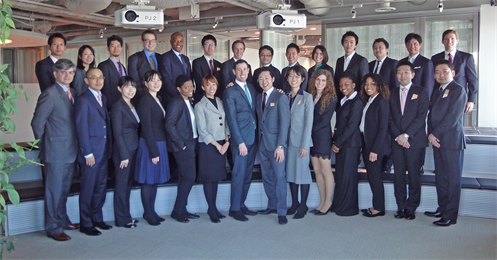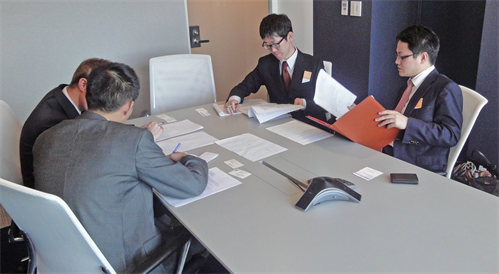 Since 1994, the Temple Law School spring semester abroad program in Tokyo, Japan has offered law students a unique opportunity to participate in a study-abroad experience that prepares the next generation of lawyers to practice in the global marketplace. With the deadline to apply for the 2015 spring semester upon us, we thought we’d talk with program Director Barry McCarthy about one of the program’s most popular courses, East-West Negotiations.
Since 1994, the Temple Law School spring semester abroad program in Tokyo, Japan has offered law students a unique opportunity to participate in a study-abroad experience that prepares the next generation of lawyers to practice in the global marketplace. With the deadline to apply for the 2015 spring semester upon us, we thought we’d talk with program Director Barry McCarthy about one of the program’s most popular courses, East-West Negotiations.
Temple Law: Can you give us a brief overview of the East-West Negotiations course at TUJ?
Barry McCarthy: The East-West Negotiations course has been running since Temple Law’s Japan program began 20 years ago. The current teachers – Douglas Hymas and Bryan Koslow – have been involved now for about 10 years, and have been doing the negotiation portion of the class with Japanese lawyers and associates for about four years.
The course is made up of six negotiation sessions in addition to lecture and review periods, and is a hands-on experience that teaches basic negotiation techniques while guiding students’ understanding and development of their own negotiation styles and strengths. The course then explores the unique aspects of international negotiations, especially those involving Japan and other Asian countries. Each negotiation exercise introduces a new level of complexity. The negotiation sessions are a core component of the course that help cement the material covered and allow students to develop effective negotiation techniques through practical experience in an international setting.
TL: Can you describe the day-long negotiation session at the end of the semester in more detail?
BM: The special Saturday negotiation session pits teams of students against teams of Japanese executives in a near-real-world setting. Several of Japan’s largest and most respected companies send mid-level executives with varying degrees of experience with English-language multi-national negotiations to the event, which is held at the Tokyo office of a multi-national company. The event requires students to dress and behave for a professional setting. After brief introductions and an orientation, each team of students is paired with a Japanese executive team and shown their conference room for the 2.5 hour negotiation session. Each side will have received the fact pattern at least a week in advance and will have developed their negotiation strategy. The students also will have received in-class instruction on Japanese business etiquette, such as bowing, business card exchange, company hierarchy structures that impact seating and communication, etc. During the negotiation period, professors observe but do not participate in or otherwise disturb the negotiation groups, requiring the students to control the direction of the negotiation process themselves based on principles learned earlier in the course. Upon expiration of the negotiation time period, each group reports their results and enjoys lunch, usually with their opponents with whom they have a shared experience. Thereafter, all teams assemble for an hour-long general review session to compare results and to share highlights with other teams. This session is led by the professors, who also share insights and observations with the group. This final session puts the experience in context and cements the learning experience for both sides. The event concludes with a brief reception that allows all participants to network and get further acquainted.

TL: What is it specifically about these negotiations that make this course so unique?
BM: The special Saturday session, particularly with the participation of local legal professionals, is as close to real law, cross-cultural negotiation as students can ever get in law school. Situated in a foreign culture and, therefore, on unfamiliar grounds, students must interact, not with role-players, but with the foreign legal professionals they might well later negotiate with.
TL: Can you share some of the student feedback you’ve been given about the course?
BM: Absolutely. One student wrote that the course was, “One of the most fun and creatively taught courses I have ever taken. The professors are smart, funny and well organized. Their lectures taught us the fundamentals of negotiations and then we could practice our skills. This was a ‘negotiation lab’ that allowed us to be creative and then receive good feedback.” Another students simply wrote that the course was, “a highlight of my semester.”
TL: The practical experience gained during the East-West negotiations course seems to be emblematic of the semester abroad program in Japan as a whole. Can you talk about other ways the TUJ semester abroad program instills practical skills in its students?
BM: Because our student body is small, we are able to offer several other hands-on classes that focus on practical skills. For instance, in International Contract Drafting, each section is limited to 16 students, so the professor can focus in detail on how to structure, draft, review, and revise contracts in a real-world business setting. The International Tax course focuses on how companies use international tax concepts (including double tax treaties) to structure direct foreign investment. While it refers extensively to the U.S.-Japan Double Tax Agreement, it introduces concepts relevant to the structuring of transactions between a wide range of countries. The Trusts and Estates class requires students to work continuously on a will and some related instruments. In each of these classes, J.D. students are exchanging ideas and strategies with each other and with students from other countries, thereby learning valuable communicating and listening skills.
Special thanks to Barry McCarthy for sitting down and talking with us. To learn more about the East-West Negotiations course, or the TUJ Semester Abroad program, contact the Temple Law School Graduate and International Programs office at intllaw@temple.edu or by phone at 215-204-1448. The deadline to apply for the 2015 Spring Semester is October 15, 2014.
